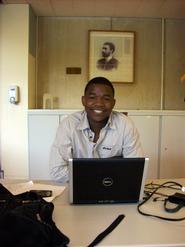
One plus one is undoubtedly two. One times one is indubitably one. But what happens when you put a whole string of these simple calculations together? That is what Tawanda Mashavave ’10 researched this summer. His project was designated as computer science research, but it was geared more toward number theory. With Professor of Computer Science Richard Decker, Mashavave analyzed integer complexity: the integer complexity of a positive integer n, denoted by c(n), is the least amount of 1s used to represent n using only additions, multiplications, and parentheses.
For instance, the number nine can be represented by a minimum of six ones, which requires parenthesis: (1+1+1)(1+1+1). The number six is likewise represented as (1+1)(1+1+1). Once mathematicians begin to plot the patterns of comparatively large numbers, like 1,000 or even 5,000, they need a computer program to solve the problem. According to Mashavave, “You’ll find some interesting behavior at that time, and I believe that we’ll find a use for integer complexity in the future.”
He is working on devising a more efficient algorithm that will help mathematicians in analyzing the behavior of the function c(n). Some research has been done on the topic, but the algorithms used were very slow in calculating integer complexity of large numbers like 100,000,000. Mashavave and Decker have come up with several conjectures that they believe will help to significantly reduce the number of calculations required to come up with the integer complexity of any integer, and hence, make the algorithm more efficient. They have spent a large amount of their time trying to prove or disprove these conjectures.
Mashavave is a computer science and mathematics double major. “I’ve always been good with numbers, and I love programming. Having enjoyed my first math and computer science classes at Hamilton, I couldn’t pass the opportunity of being part of these departments,” he said. Abstract concepts like applied theory, algorithms, and graph theory intrigue him because they require knowledge of both disciplines. After Hamilton, he wants to explore software development and get a masters in computer science.
Hamilton admissions officers went to Zimbabwe several years ago when Mashavave was in the midst of the college application process. He remembers how impressed he was by the college’s open curriculum and focus on writing. If it were not for Hamilton’s outreach to countries as far as Zimbabwe, Mashavave would not be part of this dynamic campus community. His campus activities include intramural soccer and volleyball, Quantitative Literacy Center tutoring, the West Indian and African Association, the ESOL radio show, Computer Science Programming Team, the Brothers Organization, and the International Students Association.
Mashavave is a graduate of Kutama College
For instance, the number nine can be represented by a minimum of six ones, which requires parenthesis: (1+1+1)(1+1+1). The number six is likewise represented as (1+1)(1+1+1). Once mathematicians begin to plot the patterns of comparatively large numbers, like 1,000 or even 5,000, they need a computer program to solve the problem. According to Mashavave, “You’ll find some interesting behavior at that time, and I believe that we’ll find a use for integer complexity in the future.”
He is working on devising a more efficient algorithm that will help mathematicians in analyzing the behavior of the function c(n). Some research has been done on the topic, but the algorithms used were very slow in calculating integer complexity of large numbers like 100,000,000. Mashavave and Decker have come up with several conjectures that they believe will help to significantly reduce the number of calculations required to come up with the integer complexity of any integer, and hence, make the algorithm more efficient. They have spent a large amount of their time trying to prove or disprove these conjectures.
Mashavave is a computer science and mathematics double major. “I’ve always been good with numbers, and I love programming. Having enjoyed my first math and computer science classes at Hamilton, I couldn’t pass the opportunity of being part of these departments,” he said. Abstract concepts like applied theory, algorithms, and graph theory intrigue him because they require knowledge of both disciplines. After Hamilton, he wants to explore software development and get a masters in computer science.
Hamilton admissions officers went to Zimbabwe several years ago when Mashavave was in the midst of the college application process. He remembers how impressed he was by the college’s open curriculum and focus on writing. If it were not for Hamilton’s outreach to countries as far as Zimbabwe, Mashavave would not be part of this dynamic campus community. His campus activities include intramural soccer and volleyball, Quantitative Literacy Center tutoring, the West Indian and African Association, the ESOL radio show, Computer Science Programming Team, the Brothers Organization, and the International Students Association.
Mashavave is a graduate of Kutama College
Posted August 30, 2009
